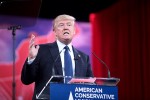Yom Yerushalayim took place Sunday, commemorating the reunification of the city during the 1967 Six Day War. The liberation of the Western Wall, a moment captured so powerfully through an iconic photo of three awe-struck young soldiers, is an unforgettable part of Jewish history.
The reunification of the city was by no means merely a symbolic or administrative event. Neither was it solely a national victory. In the millennia-long history of the Jewish people’s connection to the Second Temple, there have been just two decades when Jewish prayer at the Western Wall has been interrupted – the years between 1948 and 1967, when Jordan occupied East Jerusalem and refused freedom of religious observance at Judaism’s holiest site.
Put mildly, the reunification of the city and its spiritual implications, as well as its political ones, represent a massive historical event. So, it is hardly surprising that emotions run high on the subject. Now, at a time when political extremism is sadly on the rise in so many places in the world, including in Israel, it is likewise hardly surprising that Yom Yerushalayim would be a lightning rod for the worst elements in Israeli society.
On Monday, top Israeli leaders condemned some of the words and deeds of a minority of participants in Sunday’s Yom Yerushalayim parade. Some of the men who marched through the Old City’s Muslim Quarter wore T-shirts with phrases like “Rabbi Kahane was right” and images of a machine gun emerging from a Star of David. Some marchers chanted calls for death to Arabs and slapped racist stickers on the shutters of Muslim storefronts that had wisely closed for the afternoon. Young men shouted “Whores” at a group of Arab women watching the passing spectacle.
Yom Yerushalayim is a day for celebration. While imperfect, Israel ensures freedom of worship at holy sites under its jurisdiction, something occupying Arab forces (that is, Jordan) refused to do. Most of the celebrants Sunday did not exhibit xenophobia and hatred.
Still, the best are tainted by the worst. In this space several weeks ago, in relation to the appearance of Nazi flags and other atrocities at the “truckers” protest in Ottawa, we said: “It is no less abhorrent to march alongside people carrying a swastika flag than it is to carry a swastika flag.”
To march alongside evil is to condone it.
To their credit, top Israeli leaders responded strongly, albeit a day after the abhorrent actions took place. Benny Gantz, the defence minister, said it is time to declare several of the groups involved in the mayhem as terrorist groups. Among them are extremist groups like La Familia and Lehava.
Israelis – and Jews – are very often held to a higher standard than other nations. This is a phenomenon with deep, discriminatory roots. Put simply, it may be a natural, though cynical, human reaction to adherents of the original form of ethical monotheism, i.e. if Jews cannot exemplify superhuman virtue, the justification presumably goes, why should the rest of humanity feel compelled to behave any better?
Conversely, though, the fact that critics (or enemies) of the Jewish people are hypocrites should not affect Jews’ own striving for ethical conduct. The bad behaviour of others is not an excuse for bad behaviour by anyone. Israel as a state – and Jews as a people – must roundly condemn the perpetrators of xenophobia and violence last Sunday.
And Gantz is right. It’s time to call out these perpetrators for what they are.


